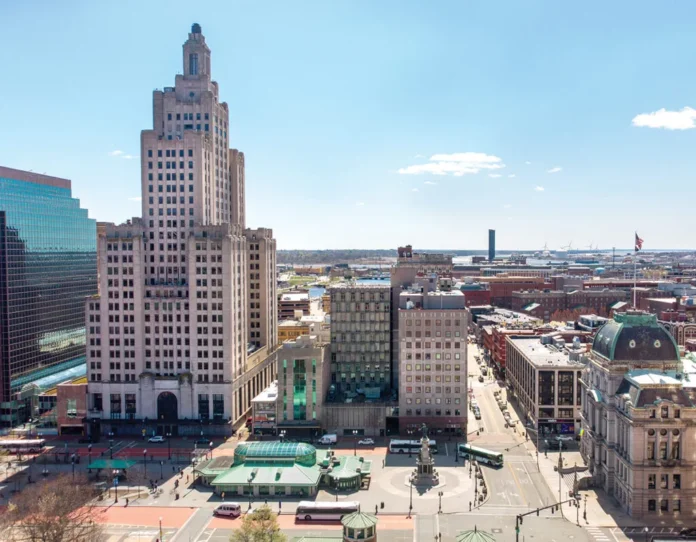
PROVIDENCE – Plans to revive the dormant “Superman” building are inching closer to reality, with a city panel giving preliminary approval to a 30-year tax deal integral to its redevelopment.
With the Providence Committee on Finance’s 5-0 vote Monday, the proposed tax- stabilization agreement now heads to the full City Council for review and approval.
A 30-year property tax discount is one of several city and state incentives baked into the $223 million redevelopment plan for the Superman building. If approved, the tax treaty would save the owners of the Industrial Trust Co. building $29 million in taxes over the next 30 years, according to city financial analysis.
The committee’s vote came after nearly three hours of impassioned testimony from community members and discussion by city lawmakers, with the divide over the tax treaty as stark as the skyscraper’s silhouette against the Providence skyline.
Proponents framed the tax deal as an integral piece to revitalizing not only the building itself, but the entire downtown, bringing jobs, housing and a sense of vibrancy that will rejuvenate the area.
“The gaping hole at the end of Westminster Street can only be repaired and filled with one solution,” said Nicholas Hemond, the attorney representing building owner High Rock Development LLC. “This is the last piece of the puzzle.”
The project has already been approved for $21 million in state incentives through R.I. Commerce Corp., a $10 million loan from the Providence Redevelopment Agency and a $5 million allocation in the city’s fiscal 2023 budget.
Jeffrey Miller, executive vice president of investments for R.I. Commerce Corp., likened the complex public-private partnership funding the project to a Gordian knot, warning the entire deal could unravel without the city tax deal.
The proposed tax deal saves the developer $29.4 million, or just over 50% of the property taxes over the next 30 years in exchange for increasing the property’s value through redevelopment.
Right now, the developer pays just over $500,000 in property taxes based on the $14.2 million assessed value of the empty building. By the time the project is completed, the property will be worth $63.4 million, with a $2.2 million annual tax bill, according to the city analysis.
But not everyone agreed that the deal was worth it. A chorus of progressive lawmakers and community advocates denounced the lack of truly affordable housing within the 285 apartments planned for the building. While 20% of those units have been designated as income-restricted, the proposed rents – ranging from $1,300 to $2,000 a month – are a far cry from what most people can pay.
Terri Wright, housing justice organizer of the Tenant and Homeowner Association at Direct Action for Rights and Equality, accused city lawmakers of putting “profits over people,” adding that all downtown Providence has to offer is “bars, banks and privilege.”
Several critics suggested an alternative housing makeup that reserved one-third of the apartments for people who earn less than 30% of the area median income, equal to $20,700 for one person or $29,550 for a family of four.
Councilwoman Helen Anthony, who sits on the finance committee, peppered city administrators with questions about the financial details, such as how the increase in property value was determined and the specific protections of agreements struck between the developer and the state.
Ultimately Anthony, alongside her four committee colleagues, all backed the proposal with a positive recommendation.
“It’s clear we need to move forward and transform a dilapidated property back into a vibrant economic engine,” Councilwoman Jo-Ann Ryan, who chairs the committee, said in a statement. Ryan and other city lawmakers also lauded the economic benefits, which according to the developer include 1,600 construction jobs and 240 permanent positions, plus $28.1 million in income, sales and business tax revenue (direct and indirect) over the first 30 years.
Also on Monday, the finance committee gave preliminary approval to a new tax agreement for the former Providence Journal building on Westminster Street and the neighboring Kresge Building, a former outlet of the national five-and-dime chain.
Originally slated to become a boutique hotel called Hotel Hive, Washington, D.C., developer Jim Abdo has since ditched that plan in favor of a 124-unit apartment complex known as Hive Life. The change of plans, as well as delays in the construction timeline, require a new tax deal to replace the one approved in 2019.
While the new agreement uses the same formula of incrementally increasing property taxes over a 20-year period, the actual tax savings to the developer would increase by more than 50% – to $4.2 million over the course of 20 years, according to a new city analysis.
The original agreement would have saved the developer $2.7 million in taxes.
The actual cost of the project has risen from $39 million to $52.7 million, according to estimates provided by the developer on Monday. (A previous estimate from the mayor’s office stated the new project would cost $27 million).
Currently, the vacant Journal Building and the Kresge Building are worth $3.9 million and generate $139,700 in city taxes a year.
If the properties are redeveloped under the apartment complex proposal, they will be worth $20.9 million in 2041, generating $739,000 in taxes a year at full taxation. The prior hotel development would have also increased the property value, but by less, to $14.3 million by 2038, according to the city analysis.
The project features 124 studio and 1-bedroom apartments, along with 29,000 square feet of retail space including a pizza restaurant, coworking space and 1970s-style “Barcade” basement lounge, according to plans submitted to the city.
(RECASTS lede, updates throughout with votes, comments.)










